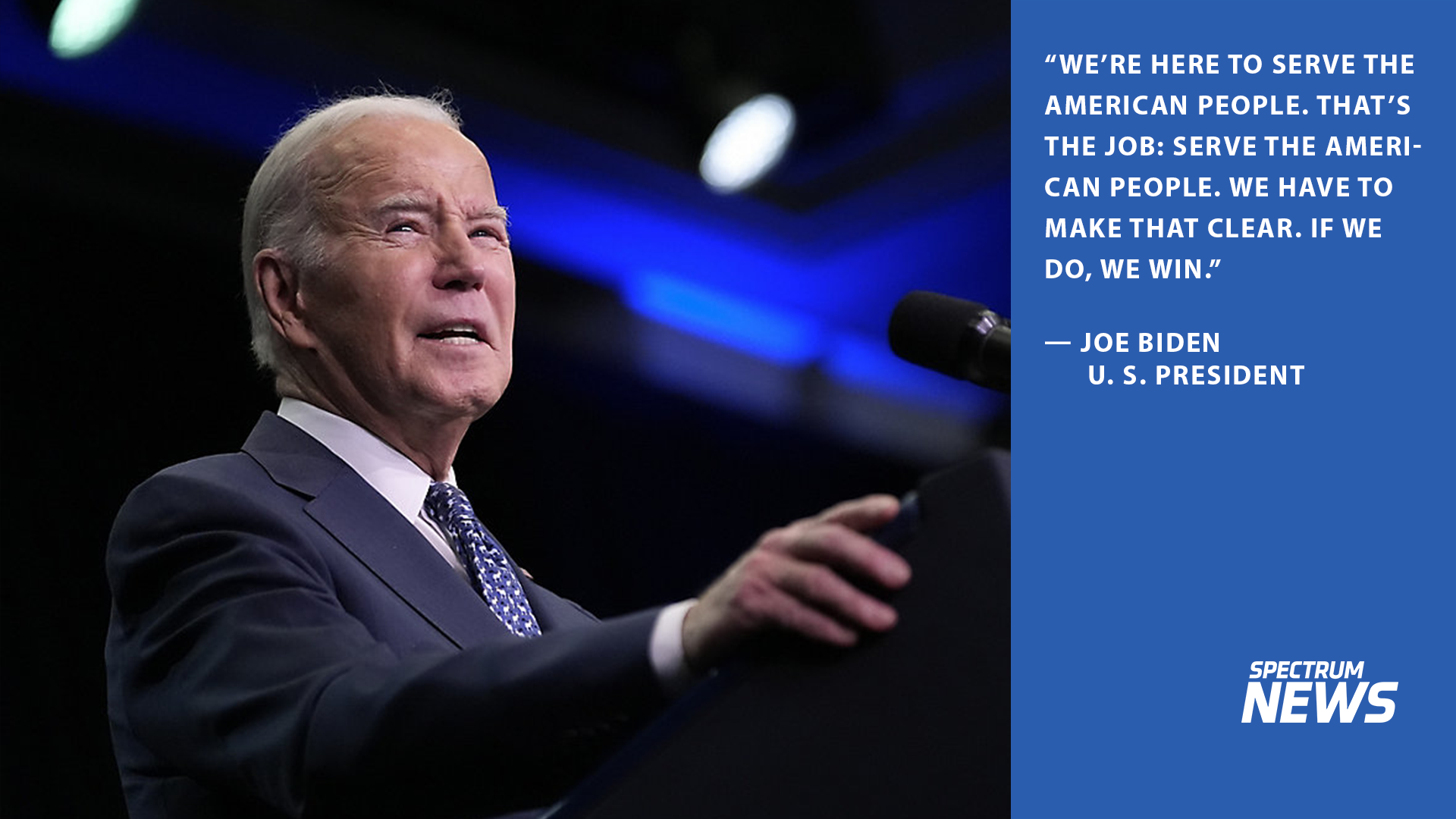Every Sunday, our full Spectrum of politicos give their fact-based takes on what to expect this week from our backyard to Tallahassee and Washington.
 Greg Angel
Spectrum News Anchor
Greg Angel
Spectrum News Anchor
Keeping pace with the times
We got a rare look at history this last week, hearing LIVE oral arguments in front of the United States Supreme Court.
They must answer whether states can keep former President Donald Trump off of November ballots in his bid to win back the White House. The Colorado State Supreme Court said Trump is ineligible, siding with arguments Trump violated the Insurrection Act and aspects of the 14th Amendment.
What’s unprecedented is not only the question before the court, but the public access to the court.
The world had an opportunity to hear from both sides, and justices, in a rare live audio broadcast of the oral arguments.
Despite the high-profile court cases that capture the nation’s attention in made-for-TV hearings, federal courts are quite strict, and are a place where the legal process plays out in perhaps its most raw form. There is no broadcasting of cases, no electronics even allowed in federal courthouses, much less the Supreme Court.
However, in this consequential case, a rare granting of exception where the U.S. Supreme Court provided live audio broadcasts, in real time, for the world to see the transparent process of our legal system.
This step matters. First Amendment advocates would hope it’s only the first step of many.
This is a step where, for as wild of an idea it is, the federal court system should take note from the Florida court system.
Many years ago, then-chief public information officer Craig Waters helped steer the Florida Supreme Court and state court system into a new frontier of public access. It was with Waters’ help that we now have courtrooms across Florida with standard policies on public and media access.
Even this last week, the Florida Supreme Court justices heard oral arguments in a consequential case of their own. They must decide whether to allow an abortion-related amendment on November’s ballot that would allow Florida voters to decide whether abortion rights should be enshrined in our state constitution.
It is a critical issue impacting nearly every Floridian. It’s of consequence and the public should applaud, cherish, and protect that the Florida Supreme Court is as accessible as it is, providing live audio and video broadcasts of the hearings in real time.
Florida has a robust public access system in place, not just in terms of the courts, but with the records. Many county clerk of court offices have online systems giving free, unfettered access to public records.
On the contrary, the federal clerk of the court system runs a program called PACER where members of the public must pay to access those very public records that should be already made available.
First Amendment advocates have fought for years to do away with PACER, and questioned the need for a revenue generating system in the first place.
There is no telling if the feds will ever see things the way Florida does, but one could hope that they’ll realize the importance of opening the door and keeping pace with the times.
 Phillip Stucky
Spectrum News Digital Producer
Phillip Stucky
Spectrum News Digital Producer
A tough week to be a speaker
You don’t have to look very far to see an article decrying Speaker of the House Mike Johnson’s “failure” to get key legislation passed this week. Between the failed vote to impeach Homeland Security Secretary Alejandro Mayorkas and the rejected Israel aid package supposedly favored by Republicans, there weren’t a lot of victories to slide into the “W” column this week.
Johnson came into the office with high hopes. He gave plenty of interviews and discussed what he hoped to get done, but he’s been much less willing to randomly speak with reporters in the halls of Congress. A New York Times article last week showcased the fact that Johnson now appears to be on the phone anytime he’s walking by reporters, allegedly in an attempt to avoid speaking to them. Of course, it’s possible he’s just that busy trying to get things done.
Johnson defended his record by saying that the impeachment vote failure wasn’t reflective of his leadership, but reflective of the House itself.
So, what does it take to become a successful speaker? Is it the esteem of their peers? Is it the goodwill of the media? No. The best way to gauge if a speaker is successful is if they’re able to get done what they want to get done.
So what does it take to get things done? Historically, speakers of the past have been good at getting other lawmakers to do what they want. There are aspects to the job like negotiating and fundraising that are very important. It’s very easy to get lawmakers to take a risk on a legislative vote if they know you are going to help them get elected next campaign cycle.
Successful speakers are also excellent negotiators. They can understand that if a member has a difficult vote ahead of them — one that may be unpopular in their district — letting them vote no on that legislation is a favor just as important as anything else.
It’s an undeniable fact that former Speaker of the House Nancy Pelosi has been successful in getting her legislative goals passed into law. She is, after all, the speaker that presided over the initial passage of the Affordable Care Act. She was a formidable fundraiser and was very good at remembering important details about what they needed. I remember attending a breakfast with her, and four months later, she asked me about my dog, and even remembered his name.
Former Speaker Newt Gingrich is perhaps best known for bringing former President Bill Clinton to the table on several pieces of legislation, including the capital gains tax cut, and his “Contract with America.” Sure, there were later issues, but he also wielded powerful fundraising and legislative acumen in his efforts.
Let’s get back to Pelosi. When she was at the height of her power in the early days of former President Barack Obama’s first term, Pelosi was a party powerhouse who knew the right donors, the right lawmakers to approach for votes and the right ways to present information.
Let’s fast forward to her last few years in the post. A new generation of lawmakers found that her traditional power no longer held much sway over their decisions. They didn’t need her fundraising. A single tweet or email blast could address all their election needs. They didn’t need to respond to her internal pressure to vote the right way on a piece of legislation, because they had their own way to put pressure on lawmakers through online followers and protest groups.
I say all of that to say this: Has Johnson failed to meet some of his policy goals this week? Without a doubt. But it’s also true that the traditional levers of power that past speakers have relied on are quickly going away in the new connected world created by the internet and an always-on society.
 Ybeth Bruzual
Spectrum News Anchor
Ybeth Bruzual
Spectrum News Anchor
A solution to Puerto Rico's failing power grid
Imagine going 12 months without power. An entire year! That is what people in Puerto Rico have had to live through multiple times in recent years. It’s one of the many reasons many have left the island for the mainland in recent years.
The last time I was in Puerto Rico for Spectrum News covering hurricane Fiona in September 2022, the ENTIRE island was under a blackout. The powerful hurricane had barreled through the island and I have to tell you, it was surreal to drive at night for two hours to get back from the worst hit area because it was pitch black.
After four days of coverage, my photographer, Joh, and I got to get on the plane to return to the comforts of home, but for the more than 3 million people who call Puerto Rico home, the situation was dire.
What’s new:
U.S. Secretary of Energy, Jennifer M. Granholm, was on the island a few days ago to announce the U.S. Department of Energy's completion of a two-year study that says there is hope for Puerto Rico.
The DOE and FEMA released a summary of the Puerto Rico Grid Resilience and Transitions to 100% Renewable Energy Study. The assessment has determined the needs of Puerto Rico’s aging power grid, which has taken a beating by years of neglect.
The Solution: Focus on renewable energy. Vouchers have been given out, in a limited amount, for some island residents to get solar panels that are typically quite pricey.
How bad has it been in Puerto Rico?
According to the DOE and its new report:
“In September 2017, Hurricanes Irma and Maria caused most of the transmission and distribution system in Puerto Rico to collapse, leading to one of the longest blackouts in U.S. history and leaving residents in some parts of the territory without electricity for almost a year. Merely five years later, Hurricane Fiona again knocked out 100% of the grid for as long as four weeks in parts of Puerto Rico, underscoring the critical need for urgent electrical grid modernization in the region.”
Help is on the way:
“If it wasn’t for Americans, we’d have no electricity! We’d still be finding our way around the house with lanterns.”
That’s what my grandma Aida would say all the time when I was a kid growing up in Puerto Rico. If she were alive today, she might take a deep sigh and hope the federal government could expedite this process to bring power back to Puerto Rico.
 Gary Darling
Spectrum News Producer
Gary Darling
Spectrum News Producer
People get involved in the political process
I probably am underselling it when I say that a lot was going on politically this past week.
I mean, it was basically nonstop from the federal level on down.
Tuesday night on “Political Connections,” we led the show with the Mayorkas impeachment vote. While we were live on TV with the show, a committee meeting room was heating up. The Senate Community Affairs Committee was debating House Bill 1122, Historical Monuments and Memorials. This bill generated very impassioned opinions and commentary and even led to a member of the public being ejected from the meeting by the sergeant-at-arms.
When we were done with our live show, we watched the rest of this meeting as it unfolded live in Tallahassee. Because of the reaction by both the public and the lawmakers, we decided to offer viewers, without commentary or play-by-play, an extended look at that meeting later in the week. This is your opportunity to see what’s happening at all levels of government.
Is what happens in Congress important? Sure, but I would argue that you need to look at all levels of government, right down to your local city or town councils, to get a feel of what’s really happening and what’s being debated. Knowledge is power, and as voters, you hold the power as to who you want working for you in ALL levels of government. It’s up to you.
 Jason Delgado
Spectrum News Reporter
Jason Delgado
Spectrum News Reporter
Who's getting a raise?
Serving as Florida governor might sound like a sweet gig. Good health care, free housing and a six-figure salary. What’s not to like?
Well, consider this: As the leader of the country's third largest state, Gov. Ron DeSantis’ $141,400 salary is less than that of at least 10 other governors.
Even within the Florida government, plenty of others earn more than DeSantis. For example, Education Commissioner Manny Diaz earns more than $300,000 a year.
That discrepancy, however, may soon change.
Under legislation approved in the House, starting in 2027, the Florida Governor could earn up to $251,414 — the same salary as a Florida Supreme Court justice.
Meanwhile, the lieutenant governor and state cabinet officials are also in line for a raise. Under the bill, they could earn just shy of DeSantis’ current salary. Currently, the lieutenant governor and cabinet officials earn around $135,000.
While many lawmakers see a need to adjust salaries, there are a few detractors. Among them is Jacksonville Democratic Rep. Angie Nixon. On the floor this week, she proposed an amendment to reduce the governor’s salary to one penny.
The amendment is a call-back to the era of Gov. Rick Scott, who donated all but a penny of his salary to charity.
In-Depth Political Coverage
1. Orange, Osceola expand civil citation program to keep nonviolent juveniles out of jail
The state attorney’s office covering Orange and Osceola counties is updating the juvenile civil citation program, with the goal is to help nonviolent juvenile offenders stay out of the system.
2. Some residents shocked at Volusia County’s decision to move forward with fuel farm
Many Ormond Beach residents that attended Tuesday’s county council meeting were shocked with what they heard from their local officials.
3. Florida bill would require biological sex on State IDs
A new piece of legislation, House Bill 1639, seeks to legally define the words of gender and sex in the state and for state IDs like to reflect a persons sex at birth.
4. Tampa council to hear 2nd pitch for a new high-rise condo along Bayshore Boulevard
The Tampa City Council will hear a second pitch Thursday from Miami-based the Related Group on a proposal for a new high-rise condo along Tampa’s Bayshore Boulevard.
5. Bill would create better access to emergency insulin refills
A bill scheduled to go before a Senate committee Thursday is aimed at changing the way people can get insulin in emergency situations.
6. Economy, food insecurity on voters’ minds as 2024 election approaches
As the 2024 election approaches, issues voters will be focused on are coming into focus. Surveys and polls show one of the most important issues to voters is the economy. A University of Michigan survey shows consumer sentiment jumped up in the last two months by 29% - the most since 1991. And a recent government report shows inflation is slowing down.
7. Legislation takes aim at sleeping on streets, creating concern for homeless
This week, Gov. Ron DeSantis spoke in support of House Bill 1365. The bill, filed last month, would make it illegal for anyone to sleep or camp on public property without a permit if passed.
Quote of the Week
Delivering remarks at their annual policy retreat on Thursday, President Joe Biden rallied House Democrats around the idea that they will win in November if they paint a clear contrast between their “unity” and the GOP’s “cynical political games.”
“We have to make the contrast, the choice, crystal clear,” Biden told Democrats in the lower chamber in Leesburg, Va. “Time and again Republicans show they are a party of chaos and disunion.”









